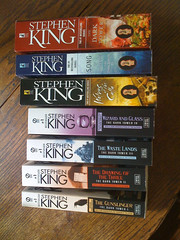This post, from bookseller Rich Rennicks, originally appeared on his The Word Hoarder blog on 10/20/09.
[The intent of this post is to step back and consider the industry-wide implications of $8.99 bestsellers. I’m making multiple assumptions where I do not have all the info, so I invite corrections, counter arguments and real numbers before anyone jumps off any cliffs.]
The shoe is on the other foot this morning, with indie booksellers contemplating deserting publishers for cheaper $8.99 books at the mass merchants. Amazon.com, Walmart.com and Target.com are waging a price war over the top dozen-or-so projected bestsellers of the holiday season. To do so they are all willing to make a loss of $5-$6 on each book – which is staggering, because last time I checked market share wasn’t legal tender. Naturally, indie bookstore buyers have concluded that if you can purchase books you know your customers will want, at a lower price than directly from the publisher, and force a competitor to take a loss on each copy, why the hell wouldn’t you?
This is my attempt to make a case not to desert the publishers. [Full disclosure: I work for a small publisher and part-time for an indie bookseller, hence the need to look at the situation from both sides.]
The reason to support publishers by buying directly is because of all the services they deliver which indie bookstores value: selection, curation, marketing, creating demand? (You know, many of the same things we tell customers they’re supporting when they shop indie…) The irony of this situation is not lost on anyone.
The question is, who loses if indie bookstores cancel and reorder at 8.99 from the gamblers who are prepared to take a loss of almost $5-$6 on each copy? Publishers theoretically ship the same number of books, just through different channels. Those publishers are making the same profit whether they ship through Wal-Mart or directly, as giving one channel a larger discount than another would be illegal, right? [Please correct me if I’m wrong, but I was under the impression that the ABA took publishers to court over this exact issue several years ago.]
Read the rest of the post on Rich Rennicks’ The Word Hoarder blog.

 Other writers believe that ideas are easy, it’s in the execution of those ideas that the hard work really begins. You have to show up every day and slowly give shape to your ideas, trying to find just the right words, searching for the right turn of phrase, until it all morphs into something real.
Other writers believe that ideas are easy, it’s in the execution of those ideas that the hard work really begins. You have to show up every day and slowly give shape to your ideas, trying to find just the right words, searching for the right turn of phrase, until it all morphs into something real. “If you want to be a writer,” says Stephen King, “you must do two things above all others: read a lot and write a lot.”
“If you want to be a writer,” says Stephen King, “you must do two things above all others: read a lot and write a lot.” Well, at least it’s getting somewhere! I’d like to extend a Holiday Thank you to all the Publetarians and various assorted other readers out there who’ve enjoyed, or been annoyed by my rants and articles. Thanks, especially to those who’ve left me comments I could actually use — there have been quite a few of them. I may be an old crank, but I’m still learning, and the cranking is beginning to get easier as I turn the handle!
Well, at least it’s getting somewhere! I’d like to extend a Holiday Thank you to all the Publetarians and various assorted other readers out there who’ve enjoyed, or been annoyed by my rants and articles. Thanks, especially to those who’ve left me comments I could actually use — there have been quite a few of them. I may be an old crank, but I’m still learning, and the cranking is beginning to get easier as I turn the handle!